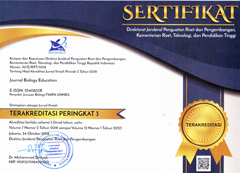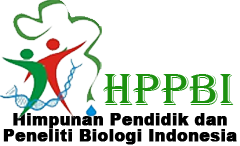PENGARUH PENDEKATAN PROBLEM-BASED LEARNING DALAM MATERI PENCEMARAN LINGKUNGAN TERHADAP KEMAMPUAN ANALISIS
Abstract
Penelitian ini bertujuan untuk menguji pengaruh pendekatan Problem-based Learning (PBL) dalam pembelajaran terhadap kemampuan analisis siswa SMA 1 Ambarawa. Penelitian ini merupakan penelitian Quasi Experimental Design dengan pola Pre and Post-test Design yang diterapkan pada kelas X-7 sebagai kelompok kontrol dan X-8 sebagai kelompok eksperimen, pada materi pencemaran lingkungan. Teknik Pengambilan sampel menggunakan purposive sampling. Data tingkat keterlaksanaan PBL diperoleh melalui lembar observasi.  Data jumlah solusi siswa dikumpulkan dengan angket dan lembar observasi. Data kemampuan analisis siswa dikumpulkan dengan tes. Data dianalisis secara kuantitatif. Data dianalisis dengan uji t dan uji regresi linier sederhana. Hasil observasi menunjukkan tingkat keterlaksanaan PBL tergolong tinggi (81,1%). Hasil uji t menunjukkan perbedaan yang nyata dari kedua kelompok (thitung>ttabel). Uji regresi linier sederhana mengindikasikan bahwa PBL berpengaruh nyata pada kemampuan analisis siswa (nilai sig.<0,05, r kuadrat 0,281). Simpulan dari penelitian ini adalah penerapan pendekatan PBL berpengaruh positif terhadap kemampuan analisis siswa.
Â
This research aimed to determine the effect of the implementation of Problem-based Learning (PBL) approaches of teaching on student’s analysis skills at SMA 1 Ambarawa. This study was a Quasi Experimental Design with Pre and Post-test Design which was applied on X-7 as a control group and X-8 as a experimental group. The subject studied was Environmental Pollution. Sample was collected with a purposive sampling technique. Data of the implementation of PBL approaches were collected by observation sheet. Questionaire and observation sheet were used to collect student’s solutions skills. Test was used to collect data of student’s analysis skills scores. Data were analyzed by using quantitative methods. Data were analyzed by t-test and simple linear regression test. The findings showed that level of implementation of PBL approaches were high (81.1%). T-test result showed that there was a significant difference between both groups (tcount>ttable). Simple linear regression test indicated that PBL brought a significant effect on students’s analysis s kills (probability sig.<0.05, r square 0.281). The conclusion of this research was that implementation of PBL approaches had a positive effect on student’s analysis skills
References
Akmar SN & LS Eng. 2005. Integrating Problembased Learning (PBL) in Mathematics Method Course. Electronic Journal of University of Malaya. Journal of Problem-based Learning 3 (1).
Arends LR. 2008. Learning to Teach (seventh edition). New York: McGraw Hill Companies.
Berlyne DE. 2000. A Theory of Human Curiosity. British Journal of Biology 45 (3): 180-190.
Beswick. 2000. An Introduction of the Study of Curiosity. Disampaikan pada A presentation at St. Hilda’s College Senior Common Room, Fellows night. 10 Mei 2000.
Chin C & LG Chia. 2005. Problem-based Learning: Using Ill-Structured Problems in Biology Project Work. Singapore. Wiley Production.
Dasna IW & Sutrisno. 2007. Pembelajaran Berbasis Masalah (Problem-based Learning). Online at http://lubisgrafura.wordpress.com/2007/09/19/pembelajaran-berbasis-masalah/ [ diakses tanggal 13 Maret 2011]
Duch BJ. 1995. What is Problem-based Learning? About Teaching: A newsletter of the Center for Teaching Effectiveness 47. Onlineat:http://www.udel.edu/pbl/cte/jan95-what.html [diakses pada tanggal 19 Juli 2012]
Gerdes D. 2012. Comparing PBL and Traditional Methods. USA. Illinois Mathematics and Science Academy.
Kek M. 2011. The Power of Problem-based Learning in Developing Critical Thinking Skills: Preparing Students for Tomorrow's Digital Futures in Today's Classrooms. Journal Article of Higher Education Research and Development 30 (3).
Sockalingam N & HG Schmidt. 2011. Characteristics of Problems for Problem-based Learning : The Student‟s Perspective. The Interdisciplinary Journal of Problem-based Learning 5 (1) article 3.
Suci NM. 2008. Penerapan Model Problem-based Learning Untuk Meningkatkan Partisipasi Belajar dan Hasil Belajar Teori Akuntansi Mahasiswa Jurusan Ekonomi Undiksha. Jurnal Penelitian dan Pengembangan Pendidikan.
Warmada IW. 2004. Problem-based Learning Berbasis Teknologi Informasi (ICT). Makalah disampaikan pada CAFEO-21 (21st Conference of the Asian Federation of Engineering Organization). Yogyakarta. 15 Mei 2004 & 22-23 Oktober 2003.
Lakoro R. 2009. Mempertimbangkan peran permainan edukasi dalam pendidikan di Indonesia. Seminar Industri Kreatif ITS Tahun 2009. Surabaya
Pranata M. 2004. Efek redundansi desain pesan multimedia dan teori pemrosesan informasi.J. Nirmana 6(2): 171-182
Rahmani N. 2011. Pengajar cerdas dengan joyful learning. On line at www.bppk. depkeu.go.id/pengajar-cerdas-dengan-joyfullearning.pdf
Shaffer DW., Squire KD., Halverson R., & Gee JP.2004. Video games and the future of learning. Phi Delta Kappan. 87 (2): 104-111
Sugiyono. 2008. Metode Penelitian Kuantitatif, Kualitatif dan R & D. Bandung: Alfabeta.
Sukmadinata N.S. 2009. Metode Penelitian Pendidikan. Bandung: Remaja Rosdakarya
Suprapto. 2006. Peningkatan kualitas pendidikan melalui media pembelajaran menggunakan media teknologi informasi di sekolah. J. Ekonomi dan Pendidikan 3(1): 34-41.
The copyright of the article once it is accepted for publication shall be assigned to the journal as the publisher. The intended copyright includes the right to publish the article in various forms (including reprints). The journal maintains the publishing rights to the published articles.
This work is licensed under a Creative Commons Attribution 4.0 International License.







